Abstract
The level of entrepreneurial activity, the proportion of small business in the regional economy is a very important indicator of regional social and economic development. The level of entrepreneurial activity in modern Russia remains rather low due to various circumstances. In this situation, the analysis of the level of potential entrepreneurial activity helps to define reserves of entrepreneurial activity of a region. The paper focuses on the social and demographic features of social portrait of a potential entrepreneur, as well as factors of increasing of entrepreneurial activity and of hampering the desire to become an entrepreneur. The paper presents the results of the monitoring research on the competition development in a region of Russia. 3000 respondents out of 20 districts of the region, including urban districts and the regional center took part in the survey in Nizhny Novgorod region in 2018. Within the area, the random route sample was controlled by gender and age and represented the area residents. The paper argues that there is higher level of social activity among the potential entrepreneurs. Potential entrepreneurs have more financial resources and social capital, which could be used to start a new business, smaller part of them could become forces entrepreneurs. The majority of potential entrepreneurs wait for favorable conditions when starting a small business would improve their financial position and not just would help to survive. Such situation makes much more actual investigation of factors that hampers small business development.
Keywords: Businessentrepreneurial activityNGOregional social and economic development
Introduction
The national plan for competition development in the constituent entities of the Russian Federation and the road map as a part of it, considers creating of conditions for the development of entrepreneurship (Decree of the President of the Russian Federation, 2017). An important aspect of the development of competition in the field of entrepreneurship is not only the level of entrepreneurial activity that already take place, but also the potential of entrepreneurial activity in the region.
This article meets the task of analysing the level of potential of the population to start their entrepreneurial activity. The paper presents the social portrait of a potential entrepreneur in a Russian region, attitudes to the possibility of starting up own business, as well as the level of willingness of potential entrepreneurs to participate in regulating competition development processes in the regional market.
Problem Statement
Defining the potential of entrepreneurial activity level is one of the important indicator, which affects successful regulation of competition development in a region in terms of creating more favourable conditions for increasing of entrepreneurial activity of the local community. Modern Russia has a rather low level of entrepreneurial activity, while the proportion of forced entrepreneurship is increased. It is a specific feature of the economic situation in the Russian regions (Monitoring results GEM, 2018; GEM, 2018; National Report, 2017; Manohin, 2010; Malkina, 2017). The state faces with the important task of creating conditions for increasing entrepreneurial activity.
The potential of entrepreneurial activity has many factors, both external (environmental factors, macro-economic conditions, socio-cultural norms) and internal (psychological willingness of the population to participate in entrepreneurial activity; availability of capital, including money, knowledge of how to run one’s own business).
Nowadays, the majority of Russians over the last decade have not planned to open their own business during the next three years (Maslennikova & Lapaev, 2011). Comparison of indicators of attitudes towards entrepreneurship in the countries participating in the GEM project indicates a significant lag in the assessment of opportunities and abilities to start up and run a business. Most Russian respondents negatively assess the opportunities for an entrepreneurial start in their region of residence. The assessment of conditions for the creation and running a business is significantly below the average estimates in both types of countries. Russians also demonstrate extremely low confidence that they have all the necessary knowledge and skills to create and manage a company. There is a big lag in the assessment of opportunities and of a low assessment of entrepreneurial abilities, which partially explains the low proportion of respondents who said they had entrepreneurial intentions. The business sector plays a small role in the economic development of Russia (Gabelko, 2009; Monitoring results GEM, 2018).
Research Questions
The paper aims to answer the question of who are potential entrepreneurs; what motivates them to start their own business, and what hampers their entrepreneurial activity. The paper analyses attitudes of potential entrepreneurs to public activity in the field of regulating the development of competition.
Purpose of the Study
The purpose of this study is to define the level of willingness of the population to run their own business. The aim is also to identify the main features of a potential entrepreneur social portrait, and attitudes of potential entrepreneurs to social activity, the potential willingness to participate in the processes of developing competition in the region. Determining the most important socio-demographic features of a portrait of a potential entrepreneur helps to develop ways to increase entrepreneurial activity in Russian regions. The paper offers some recommendations in the field of supporting entrepreneurial activity on the regional level, based not only measures concerning local business community and start-up entrepreneurs, but also through the involvement of new participants on the regional market.
Research Methods
The public and entrepreneurs’ opinion monitoring is one of the most effective tools for measuring the potential of entrepreneurial activity of the region. The article presents the results of monitoring of consumer satisfaction with the quality of goods and services on local consumer markets, and of the state of price competition in the Nizhny Novgorod region, carried out in 2018 by the Department of Sociology of Project Activities and Pro-competitive Regulation of the Lobachevski state university in collaboration with the Research center for social systems. The research was commissioned by the Ministry of Economic Development and Investments of the Nizhny Novgorod Region. The survey includes 3,000 respondents out of 20 districts of the region, including urban districts and the regional center Nizhny Novgorod. The sample is zoned, representing the areas of the Nizhny Novgorod region in terms of population and the level of socio-economic development. Within the area, the random route sample was controlled by gender and age and represented the area residents.
The region could be considered as the average Russian region in terms of socio-economic development and the level of entrepreneurial activity (Rimashevskaya & Ivashinenko, 2013; Ivashinenko, 2014).
Findings
The potential entrepreneurship level in the region is about 26%. At the same time, three-quarters of the region’s population mentions that they will never run their own business (74%) (Figure
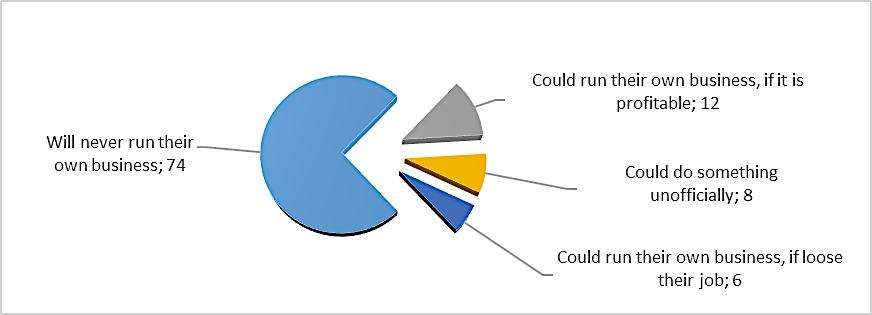
Among those who are potentially ready to run their business there is a small part of those who are entrepreneurs already (5%); therefore in this case, we can talk about the desire of expansion of their entrepreneurial activity.
The group of potential entrepreneurs includes representatives of the younger generation, more than half of the group are under 35 years (63%); more often, they are men (52%). Those who want to run their own business have a higher level of education (32% of them have higher education compared to 23% in the group who are not ready for entrepreneurial activity). The financial situation of potential entrepreneurs is to certain extent higher than in the group of those who do not plan to open their own business. The level of potential entrepreneurial activity is higher in the regional center.
The group of potential entrepreneurs includes more resourceful and more socially active part of the local community. In the group of potential entrepreneurs, there is a higher willingness for not only entrepreneurial, but also civic activity, in the field of developing a competitive environment in the region as well. In recent years, there is a tendency of increasing of the interest of the population towards regulation of the development of competition; however, at present, people more often take the role of an observer, rather than a participant (Ivashinenko, Teodorovich, & Patokina, 2019). Potential entrepreneurs more often are active in interacting with the authorities to attract attention of the latter to the problems of competition development in the region; they are more active participants in discussions on the development of competition via social networks, and show higher level of willingness to participate in the practices of competition development such as writing reviews on various websites evaluating a company's work, participating in voting for various nominations as the best company of the year in the field etc. This makes possible to describe a competition rather as a social action focused on other market participants, than as a confrontation between the aspirations of isolated and independent actors (Porter, 2000; Abolafia, & Biggart, 1991; Nee & Swedberg, 2005).
Attitude of residents who are potentially ready to run business towards social activity is also higher than that of the community in general. Although the level of social trust towards NGOs remains rather low in Russia (Abramova & Sukhushina, 2015; Mersiyanova, 2012), NGOs try to play more active role of representatives of community including business community (Timofeeva & Varyzgina, 2019; Ivashinenko & Teodorovich, 2019). The potential entrepreneurs trust more than the rest of community to the public and business community initiatives. They more often will to join these initiatives’ implementation. The potential entrepreneurs are more open towards membership in public organizations which aim the development of market competition in the region.
There are currently three most active public organizations (Opora Russia, Business Russia, the Nizhny Novgorod Association of Industrialists and Entrepreneurs) in the Nizhny Novgorod region, two of them are regional branches of all-Russia associations. Despite the greater development of the nonprofit sector in the Nizhny Novgorod region compared to other regions of Russia (Blonin, Ivashinenko, & Strelkov, 2008; Nikula & Ivashinenko, 2017), the total number of officially registered NGOs organized by entrepreneurs in the Nizhny Novgorod region is small (61 organizations) and makes up less than 2% of the total number of NGOs in the region (The activities of non-profit organizations, n.d.). At the same time, a third of them are concentrated in the regional center of Nizhny Novgorod (this is typical for Russian regions (Blonin, Ivashinenko, & Strelkov, 2008), the rest ones are spread throughout the region, by 1-2 organizations per district, mainly situated in the district center. In the situation of a rather small number of non-profit, public organizations formed by entrepreneurs, especially in the districts of the region, potential entrepreneurs whilst start up their own business mainly rely on their resources and on the help and support of their nearest surrounding.
The higher level of activity appears in a slightly higher courage for protest activity against unscrupulous market participants, including natural monopolists’ representatives. Potential entrepreneurs, more often than the rest of the population, are ready to take part in the boycott of the purchase of goods and services of unscrupulous sellers (18%), and are also ready to take part in protest rallies against price increases for natural monopolists services (9%); greater number of potential entrepreneurs morally supports such social activity (23%).
Potential entrepreneurs, more often than the population of the region on average, have got a successful experience in protecting their rights as consumers (24% compared to 17% of the population as a whole); more often they manage to defend their rights fully or partially (Figure
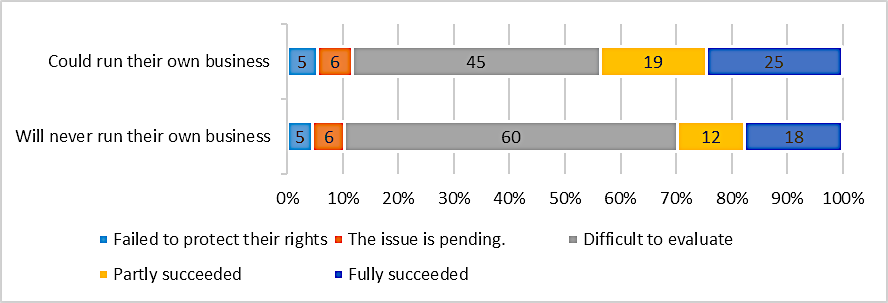
When planning the possibility of running their own business, potential entrepreneurs take into account the successful entrepreneurial experience of the people around them, people of their social network. As a rule, this is a positive experience of friends, less often relatives (Figure
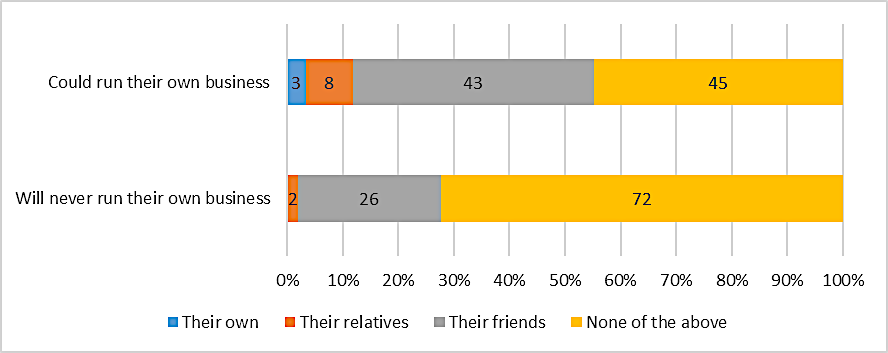
To achieve success, start-up entrepreneurs need to have not only economic and financial resources, but also social capital, which can compensate for the lack of financial opportunities, knowledge, skills, information, contacts. Inclusion into friends or family networks plays a very important role both for start-up entrepreneurs, and for those who are potentially ready to start their own business (Granovetter, 1973).
There are various types of goods and services in the top of the structure of the possible areas of business. Potential entrepreneurs are more interested in the trade sector, the construction field and auto services, consumer services (Figure
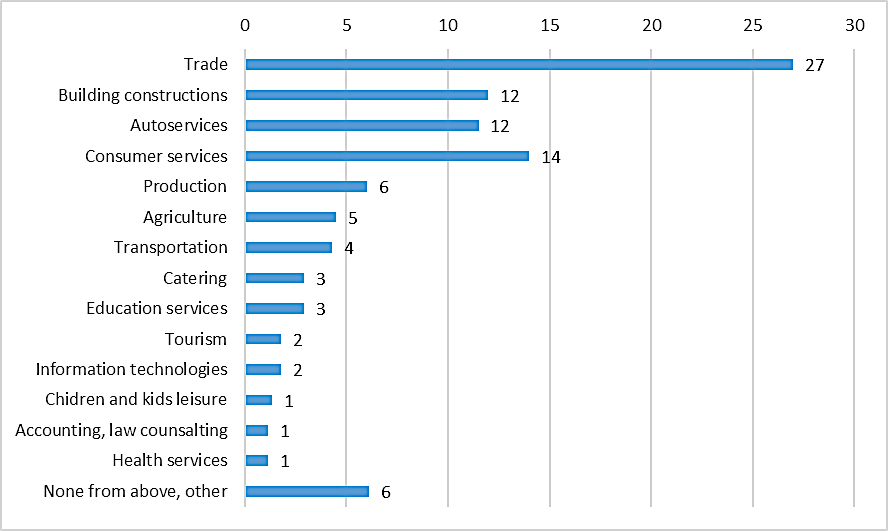
Potential entrepreneurs, admit the possibility of running their business for various reasons, in almost half of the cases it is an opportunity to get profit (see Figure
The potential of entrepreneurial activity of the population depends, among others, on the assessment by potential entrepreneurs of the level of difficulty of starting a business. The question of how easy it is to start a business, has caused largely ambiguous assessments of entrepreneurs, however, they still perceive the situation more positively than the population as a whole (Figure
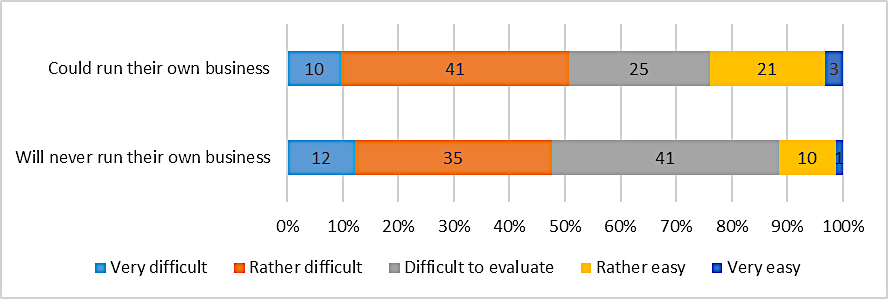
Some potential entrepreneurs fear the difficulties in the field of official registration procedure, therefore, if they would start their own small business, they would prefer not to register it (see Figure
Conclusion
Potential entrepreneurs are socially active people with a significant amount of resources. They are potentially ready not only to entrepreneurial activity, but also to participate in social activity of the local community. Potential entrepreneurs have got a higher interest towards the competitive environment of the region and towards participation in competition regulation processes in the region.
Potential entrepreneurs fear the difficulties associated with the organization and management of their in the field of reducing barriers to entry to the market, as well as stabilizing the legal framework, creating more favourable conditions for both start-ups and experienced entrepreneurs. There is a rather strong request among potential and novice entrepreneurs for assistance in organizing their business, and the legal protection of their rights as entrepreneurs. Not only state structures are responsible for that. The third sector, NGOs may be more active participants of the process. NSOs created to protect entrepreneurs’ interests and rights, are not currently perceived as an effective enough actor in the field of small business interests’ promotion and business community rights protection; however, there is the potential for the third sector to expand their activity.
Acknowledgments
The reported study is based on results of the monitoring project on the development of competition in a region of Russia, commissioned by the Ministry of Economic Development and Investments of the Nizhny Novgorod Region. The authors would like to express their deep gratitude to their colleagues from Department of Sociology of Project Activities and Pro-competitive Regulation of the Lobachevski state university, and Research center for social systems.
References
- Abolafia, M. Y., & Biggart, N. W. (1991). Competition and Markets: An Institutional Perspective. In: Amitai Etzioni and Paul Lawrence (eds.) Socio-Economics: Toward a New Synthesis. Armonk, NY: M. E. Sharpe.
- Abramova, M., & Sukhushina, E. (2015). The attitude of the population of the Tomsk region to public organizations as a marker of civil society. Bulletin of the Tomsk State University: Philosophy. Sociology. Political Science, 1(29), 1-15.
- Blonin, V. A., Ivashinenko, N. N., & Strelkov, D. G. (2008). Problems and prospects of the development of the civil society in the Nizhni Novgorod region: the integration of NGOs. Vestnik nizhegorodskogo universiteta im. N.I. Lobachevskogo, 2, 250-258.
- Bruton, G. D., Ketchen, D. J., & Ireland, R. (2013). Duane Entrepreneurship as a solution to poverty. Journal of Business Venturing, 68(6), 683-689.
- Decree of the President of the Russian Federation. (2017). On the main directions of state policy on the development of competition. Adopted on December 21, 2017 No. 618.
- Gabelko, M. V. (2009). Self-esteem by the population of their own abilities to conduct business: regional features in the Russian Federation. In Alimova T.A., Obraztsova O.I., Chepurenko A. Yu. (Eds.) The Theory of Entrepreneurship in Russia: New Approaches and Results Based on the materials of the Global Monitoring of Entrepreneurship (pp. 77-92). Moscow: HSE.
- GEM. (2018). Global entrepreneurship monitoring. Retrieved from https://www.gemconsortium.org/report
- Granovetter, S. (1973). The Strength of Weak Mark Ties. The American Journal of Sociology, 6(78), 1360-1380.
- Ivashinenko, N. (2014). Searching for a New Approach to Face Poverty on the Local Level, a Case Study in a Small Russian Town. The Debatte, 22(3), 403-419.
- Ivashinenko, N., & Teodorovich, M. (2019). The role of NGOs in local development: Latvian and Russian cases. The European Process of Social and Behavioural Sciences, 59, 369-376.
- Ivashinenko, N. N., Teodorovich, M. L., & Patokina, N. N. (2019). Involvement of the population in the processes of regulation of competition. Bulletin of the Nizhny Novgorod University. N.I. Lobachevsky. Series: Social Sciences, 1, 41-48.
- Malkina, M. Yu. (2017). Social well-being of the regions of the Russian Federation. Economy of region, 13(1), 49-62.
- Manohin, A. Yu. (2010). Strategija razvitija malogo i srednego predprinimatel'stva v sovremennoj Rossii [Strategy of development of small and medium-sized enterprises in modern Russia]. Tambov, Russian Federation: TSU.
- Maslennikova, A. Yu., & Lapaev, S. P. (2011). Razvitie predprinimatel'stva v Rossii (regional'nyj aspekt) [The development of entrepreneurship in Russia (regional aspect)]. Orenburg, Russian Federation: OGU Press.
- Mersiyanova, I. V. (2012). Trust and distribution in civil society. Scientific records IMEI, 2(1), 24-33.
- Monitoring results GEM. (2018). St. Petersburg: Graduate School of Management, St. Petersburg State University. Retrieved from https://gsom.spbu.ru/all_news/event2018_01_21/
- National Report. (2017). Global monitoring of entrepreneurship. Russia 2016/2017. Retrieved from https://gsom.spbu.ru/files/docs/gem_russia_2016-2017.pdf
- Nee, V., & Swedberg, R. (Eds.). (2005). The Economic Sociology of Capitalism. Princeton, US: Princeton University Press.
- Nikula, J., & Ivashinenko, N. (2017). Partnership between NGOs and public authorities in social orphanhood reduction in Russia. Social Policy Research Journal, 15(3), 383-394.
- Porter, M. (2000). Competition. Tutorial. Moscow: Williams Publishing House.
- Rimashevskaya, M. N., & Ivashinenko, N. N. (Eds.). (2013). Participatory approach to improving the quality of life of the population [monograph]. Nizhny Novgorod, Russian Federation: Publishing House of Lobachevsky State University of Nizhni Novgorod.
- The activities of non-profit organizations. (n.d.). Information portal of the Ministry of Justice. Retrieved from http://unro.minjust.ru/NKOs.aspx
- The report of on the condition of competition in the markets of goods, works and services in Novgorod region. (2018). Retrieved from http://novgorodinvest.ru/upload/iblock/373/37396894b27dee33 1adc29cebdd613f6.pdf
- Timofeeva, R., & Varyzgina, A. (2019). NGOS’ and local business’ collaboration for socio-economic development of Russian regions. The European Proceedings of Social & Behavioural Sciences, 59, 342-349.
- Varyzgina, A. A. (2018). Forced entrepreneurship as a preventive strategy to avoid poverty of families with minor children (on the example of small cities of the Nizhny Novgorod region). In L. A. Kirkorova, & R. A. Timofeeva (Eds.). Science, business, power - a triad of regional development: Proceeding of the III International Scientific and Practical Conference (pp. 31-36). Veliky Novgorod, Russian Federation: Yaroslav-the-Wise Novgorod State University.
Copyright information

This work is licensed under a Creative Commons Attribution-NonCommercial-NoDerivatives 4.0 International License.
About this article
Publication Date
31 December 2019
Article Doi
eBook ISBN
978-1-80296-076-1
Publisher
Future Academy
Volume
77
Print ISBN (optional)
-
Edition Number
1st Edition
Pages
1-1056
Subjects
Industry, industrial studies, project management, sustainability, business, innovation
Cite this article as:
Varyzgina, A. A., & Timofeeva*, R. A. (2019). Social Portrait Of A Potential Entrepreneur In Regional Russia. In I. O. Petrovna (Ed.), Project Management in the Regions of Russia, vol 77. European Proceedings of Social and Behavioural Sciences (pp. 194-202). Future Academy. https://doi.org/10.15405/epsbs.2019.12.05.23
